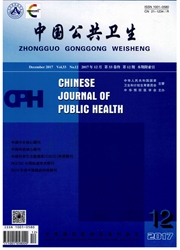

 中文摘要:
中文摘要:
目的研究慢性铝暴露对大鼠海马神经颗粒素(Neurogranin,Ng)蛋白表达的影响,探讨慢性铝暴露损害大鼠认知能力的机制。方法选择断乳后Wistar大鼠,以含有不同浓度AlCl3水溶液进行饲养。3个月后,进行跳台行为测定,蛋白免疫印迹法检测Ng蛋白表达。结果染铝组大鼠的血铝分别为(6.0±0.9),(6.1±1.2),(17.7±1.4)μg/L,与对照组(4.1±1.3)μg/L比较均升高,差异有统计学意义(P〈0.01);染铝组潜伏期分别为(166.00±21.33),(120.23±15.44),(79.86±10.35)S,与对照组(300S)比较均缩短(P〈0.01);染铝组与对照组Ng的蛋白表达降低(P〈0.05)。结论不同浓度慢性铝暴露可以引起大鼠脑铝和血铝的含量增高,使海马Ng的蛋白表达下降,导致大鼠认知能力降低。
 英文摘要:
英文摘要:
Objective To investigate the mechanism of aluminum-induced impairments to cognitive ability, by studying the effect of chronic aluminum exposure on the protein expression of neurogranin (Ng). Methods The ablactated Wistar rats were used to establish the chronic-aluminum-exposed models by the gavages of AlCl3 of different concentrations in the drinking water. 3 months later, the cognitive ability was tested by the experiment of diving tower method and the protein expression of Ng in hippocampi of rats was determined with Western Blotting. Results The concentration of aluminum in blood and brains of aluminum-exposed groups was obviously higher than that in control groups 03 (0.01) ;The latent period in AlCl3-exposed groups was shorter compared with that in control groups ( P ( 0.01 ) ; the protein expression of Ng in the aluminum-exposed groups was lower than that in the AlCl3-exposed groups. Conclusion Chronic aluminum exposure can not only increase the concentration of aluminum in blood and brains, but also reduce the protein expression of Ng, impairing the cognitive ability.
 同期刊论文项目
同期刊论文项目
 同项目期刊论文
同项目期刊论文
 期刊信息
期刊信息
